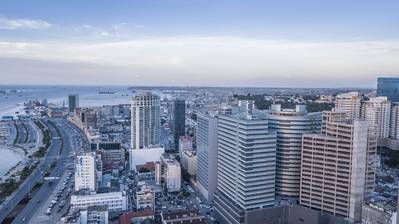Angola Hopes Reforms Will Aid Oil Assets Sales
Angola is hoping sweeping economic reforms will smooth an ambitious plan to sell key state assets, including stakes in oil company Sonangol, a share of Puma Energy and more than 100 other enterprises.
Africa's second biggest oil exporter is in a rush for cash as it struggles to cope with moribund crude prices, slumping output and years of mismanagement that left Sonangol bloated and inefficient.
In August, the government published an extensive list of assets that will be offered to investors via public offerings, stake sales, asset sales or tenders.
The swift timeline aims for an initial public offering of Sonangol in 2022, the sale of a 28% stake in Puma and its portion of oil venture China Sonangol in 2020 and the offloading of a share of Ivory Coast refinery SIR this year.
Central Bank governor Jose Massano told Reuters that there is "tremendous interest" in the asset sales, but also questions as the nation scrambles to shed an image of widespread corruption, state control and unfriendliness towards foreign capital.
"Most of the investors, they express concerns (over) the security of getting funds into Angola," he said, adding there should not be any such problems.
"In the past, we have had that difficulty, but we have also introduced changes," he said.
An anti-corruption drive has gathered steam since 2017, when Joao Lourenco ended ex-Angolan President Jose Eduardo dos Santos' nearly 40-year grip on politics.
Lourenco dismissed the former leader's daughter Isabel as Sonangol's chair later the same year and the government has sought to crack down on the influence of the ex-first family and reform bloated state institutions.
The World Bank is advising on the asset-sale process to ensure it is transparent and open to a range of would-be investors.
Changes
Massano said Angola this year cleared a backlog of money that investors had sought to repatriate and amended the law so those looking to withdraw funds in the future could do so via commercial banks, bypassing the Central Bank.
The country also scrapped rules requiring foreign companies to partner with a local enterprise.
Kwadwo Sarkodie, a partner at law firm Mayer Brown, which advises governments and international companies in Africa, said Sonangol is the crown jewel of the privatization drive.
"Sonangol is such a central organization to so much of what goes on in Angola," he said.
"The quest for cash is all-important, it's getting money in the door against the backdrop of the difficulties in recent years caused by the oil prices," he added.
Angola wants international oil companies to develop its fields and stem serious production declines. Last year, it halved taxes on some oil fields to 10 percent and created an independent body, the National Agency for Petroleum, Gas and Biofuels (ANPG) to manage oil and gas concession sales.
But observers say the nation's relatively expensive production costs are an issue.
"It's just a pretty tough environment to do deals at the moment. And Angola doesn't have the best reputation as a place to buy assets," said Anish Kapadia, managing director of AKap Energy Ltd. "The incentive isn't really there to invest. There have been some changes, but it hasn't really been enough."
Puma Energy, Angola's joint venture with trading firm Trafigura, is among the most interesting for potential investors, sources said, due in part to the lower level of expertise needed to run retail fuel and storage operations, compared with upstream oil assets.
But Puma has also been on its own asset sale and restructuring drive to turn around weak profits and lower its debt levels.
(Additional reporting by Tim Cocks in Johannesburg; Editing by Kirsten Donovan)

